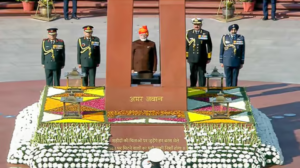SC expresses concern over delay in trial of J-K man under UAPA over alleged ISIS links

New Delhi : Expressing concern over delay in trial of a 25-year-old man from Kashmir under the Unlawful Activities (Prevention) Act (UAPA), 1967, for his alleged ISIS links, the Supreme Court has said steps must be taken to ensure that the trial is completed expeditiously.
A Bench led by Justice Surya Kant gave three weeks to the National Investigation Agency (NIA) to file an affidavit giving details of the witnesses to be examined; if the witnesses were public servants; the number of expert witnesses; and the total number of trials pending before the trial judge at Patiala House Courts here.
Accused Jamshed Zahoor Paul was arrested from the Lal Quila area here along with another person in 2018 by the NIA which claimed to have recovered a pistol with five live cartridges. Paul had connection with ISIS and he was involved in procuring arms and ammunition for committing terror acts in Jammu and Kashmir, the NIA alleged.
Paul and another person arrested with him had allegedly procured the weapons from four persons from Uttar Pradesh. They were also involved in propagating ISIS ideology in India and were in touch with another ISIS operative Abdullah Basith, the probe agency alleged.
The Bench, which also included Justice Ujjal Bhuyan, posted Paul’s petition challenging the Delhi High Court’s April 24, 2024, order denying him bail for further hearing on November 8. The High Court had said the procurement of sophisticated weapons by the accused could not be brushed aside casually.
Petitioner’s counsel Nizam Pasha urged the Bench to release him on bail, saying the trial was likely to take time and that the accused has already spent six years in jail.
Ideally, this trial should be over in one year, the Bench said even as it clarified that the court would refrain from monitoring the trial.
Noting that in some courts in Delhi there were 20 trials while in only two in others, the Bench told prosecution counsel Zoheb Hossain that there should be proportionate distribution of trials to ensure timely conclusion of trials.
CNI









